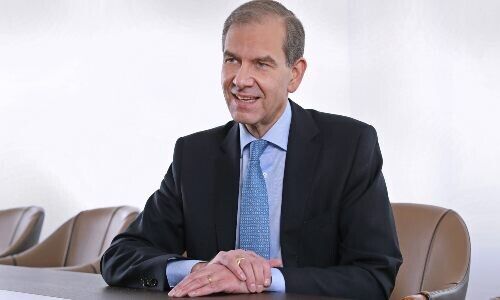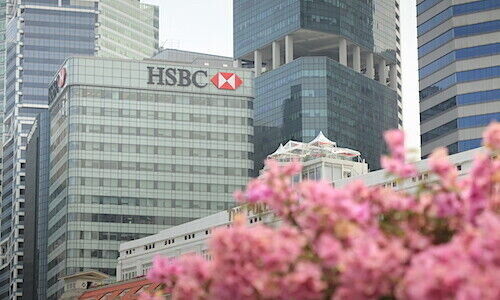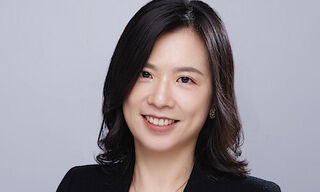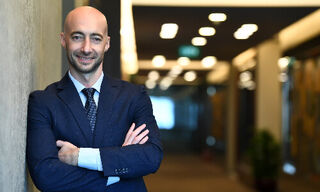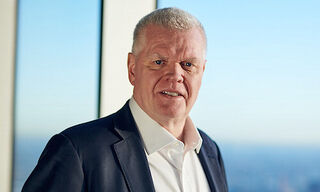Liechtenstein's LGT is relentlessly expanding its private banking position and sees itself protected from the storm currently engulfing the Swiss financial industry. When it comes to dealing with Russian assets, the authorities are sending out delicate signals, Olivier de Perregaux says in an interview with finews.asia.
Mr. de Perregaux, you have been CEO of LGT Private Banking for about two years now. Was it a difficult start?
Having been at LGT myself for almost 25 years, I knew pretty much what to expect: a family-run bank that is fortunately very well positioned and has a clear strategy and long-standing employees.
What have you already achieved?
From the outside, the most obvious is certainly the geographical expansion with the opening of a presence in Japan and Germany, the acquisition of Crestone in Australia, and the takeovers of UBS Wealth Management in Austria and abrdn in the UK. There are also many initiatives underway within the bank, including a major multi-year digitalization project.
What remains to be done?
A great deal. We want to put our plans into action even as general conditions change, sometimes significantly. Over the last ten years, we have grown organically under our own steam by around 70 percent. But we are also prepared to invest countercyclically in a broad-based business model and further acquisitions.
The biggest pillars in Asia remain Hong Kong and Singapore.
The two locations are quite complementary. In Singapore, there is strong, healthy growth with unbroken momentum.
What is the situation in Hong Kong?
Hong Kong has had a difficult time, but has shown great resilience and remains the most important capital market window to China. Rightly, the guiding principle there now is «Hong Kong is bouncing back.»
«The discussion about certain financial centers is a cliché»
Our people exude an extraordinary amount of optimism. For the whole region, geopolitical developments are an important factor.
What are your ambitions in the Gulf region?
We already have a presence in Dubai and are finding the mood throughout the Arabian peninsula is very positive. The Middle East has very good cards. However, it is unlikely to pressure large and established financial centers such as Switzerland, Singapore, or Hong Kong in the foreseeable future because of the prevailing scale.
What do you say to accusations certain financial centers are socially backward?
While we bring our Western values to our international locations, we do not close our minds to local realities and perceptions. In doing so, we often find the public discussion is cliché-ridden. Contrary to what might expect, women in Dubai appear very confident in our bank. Another example is in Asia, where women have long made up the majority of customer advisors. From this perspective, we have the potential to catch up in Switzerland and Liechtenstein.
Will competition from emerging financial centers be so great that the Swiss financial center loses its supremacy?
It does not look like it. The core capabilities of the Swiss financial center of stability, rule of law, predictability, a high level of professionalism, and long-standing traditions remain intact and will continue to be an important competitive advantage in the future. Nevertheless, as an internationally oriented private bank, we want to be represented in the important international hubs.
Last weekend, however, an earthquake shook Switzerland. What will change with the takeover of Credit Suisse by UBS?
One thing is certain. For the Swiss financial industry, two big banks would certainly be better than just one. But we should now all look ahead as far as possible and hope the integration of Credit Suisse's business into UBS goes well. Switzerland will certainly retain its leading position in wealth management and asset management, but it will play a much smaller role in investment banking. Most affected will be mid-sized companies, which will have fewer banking partners in the future.
In Switzerland, the business with independent asset managers, which also includes multi-family offices, is becoming increasingly regulated. How much does this benefit LGT, which offers itself as a partner?
We are seeing consolidation and professionalization among independent asset managers. Especially for the larger one, we offer an attractive platform with complementary offerings.
«Problems like those at Silicon Valley Bank cannot occur at LGT»
But we do not see ourselves in an active role to drive consolidation and take over independent asset managers.
How badly do you suffer from the shortage of skilled workers?
The availability of sufficient skilled workers is a major challenge everywhere, including for LGT. However, we have always been able to recruit enough staff so that we don't have to put the brakes on our growth. Especially in the Liechtenstein area, flexible working models such as home office are very helpful.
How exposed are you because of the US banking crisis?
As always in risk management, it's too late when the storm hits. With this certainty and as a bank with a long-term oriented owner, we at LGT have always taken sufficient precautions. That is why problems like those at Silicon Valley Bank cannot occur at LGT. On the one hand, the bank has very comfortable refinancing ratios. On the other hand, we work cautiously and have a very solid bank balance sheet behind us.
With the rescue package for the stumbling Credit Suisse, other banks in the local financial center have also come under suspicion.
Investors often do not act in purely rational terms. When one institution comes under pressure, others are taken to task. Regarding LGT, I can assure you that our bank is very stable and liquid.
«We do not have to serve the short-term interests of a broad shareholder base»
The largest part of our balance sheet consists of deposits from private clients who entrust their money with our bank. The rest consists mainly of interbank deposits, bonds issued by us, and equity.
To what extent does the fact that LGT is in the hands of the Princely Family help with the current uncertainty?
For generations, our owner has brought a long-term perspective and an entrepreneurial attitude. This enables us to consistently implement our strategy, even if the environment changes. We don't have to serve the often short-term interests of a broad shareholder base.
The Princely House is also the bank's largest client. Therefore other LGT clients as well as our staff have privileged access to the same investment opportunities. This alignment of interests between clients, staff, and our owner is unique.
According to studies, the liquid assets of wealthy individuals and families are expected to grow so strongly worldwide in the coming years that asset management revenues will double. How do you intend to profit from this?
There is substantial wealth creation worldwide. But you can grow very well regardless of this because the market in private banking is still quite fragmented. In recent years, we have been able to make gains even in so-called saturated markets with good services, employees, and a strong brand.
How well known is the Princely House from the small state of Liechtenstein in the world?
In Europe, Hong Kong, and Singapore, LGT is known as a leading private bank owned by an entrepreneurial family. In other markets such as Australia, Japan, or India, education is still needed to associate the bank with the Princely House.
The Russian war of aggression is shaking the world and has led Switzerland to adopt the EU sanctions. Was that a good decision?
There are still many discussions going on at the moment. But the financial center must not water down the principles of the rule of law.
«Legal certainty must be the top priority for Switzerland»
Otherwise, precedents could be set that damage Switzerland's international reputation as a reliable financial center.
So you oppose the confiscation of Russian assets?
It would be a bold step if Switzerland were to expropriate blocked Russian assets and use them as war reparations for reconstruction in Ukraine. Legal certainty must be the top priority for a country like Switzerland. In this case, that means not tampering with current practice.
How do you deal with your Russian clients since the sanctioning of Russian assets?
There are certain instances where client assets are blocked. But there are also Russian customers whose assets are not affected. We treat these customers the same as all other bank customers without any restrictions.
Critics complain that implementing the sanctions is by no means easy.
The unexpected outbreak of the war meant the first steps had to be made hastily in some cases. The technical applications in particular were sometimes unclear or insufficiently defined at the beginning. However, these initial difficulties have since been overcome for the most part.
Are other geopolitical crises currently giving you a headache?
The war in Ukraine is only the most prominent case of increasing polarization in the world. When it comes to reducing conflicts or even solving problems, capital plays a very important role. Properly deployed capital can, for example, help to stop climate change, which in turn triggers political tensions and refugee flows.
In comparison, your home market in Liechtenstein is almost a paradise. But it has no currency of its own and no central bank, which is why it is now considering joining the International Monetary Fund as a so-called «lender of last resort». What is LGT, with its headquarters in Vaduz, thinking about these plans?
Our bank would welcome Liechtenstein's involvement in the IMF. An additional anchor of stability is not a priority here, because the country and the financial industry are financially on very sound footing. Such a step would above all strengthen participation in the international community.
After completing his studies, Olivier de Perregaux gained his first professional experience at a management and strategy consultancy in Zurich and New York before joining LGT Group as Chief Financial Officer in 1999. On January 1, 2021, the Swiss national took over the role of CEO of LGT private banking from Thomas Piske.

